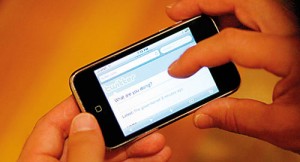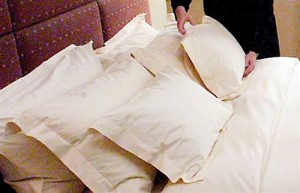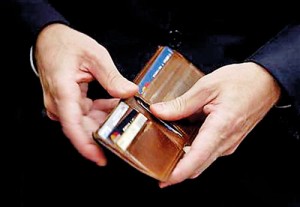Germs in your home: Time to clean up
Cleaning is a big part of our lives. Phones, jeans and even the family dog will all, at some point, need a major scrub down.
But when should that happen? And when will you have to do it all over again? We consulted a microbiologist, underwear specialist and clothing designers on how often you really need to clean everything.
Filthy phones Every day

Your mobile phone should be cleaned daily with antibacterial wipes (Reuters)
Research has found we touch our phones up to 150 times a day, and scientists in America discovered 7,000 types of bacteria on 51 phone samples. While most are harmless, some are not.
‘When you use your phone it heats up, providing the perfect conditions for bacteria to multiply,’ says Laura Bowater, a microbiologist at the University of East Anglia.
‘Enterococcus [found in faeces] and pseudomonas bacteria [animals and soil], both of which cause nasty pathogenic infections, have been discovered on phones. Phones with keypads are worse, as they have crevices. Clean yours every day with antibacterial wipes, or as often as you can.’
Sweaty sheets Once a week
We shed millions of skin cells every day, many of them in bed, and lose a litre of sweat in a typical night. Both attract dust mites that feed on it.
Mites, though harmless, produce droppings containing allergens that can trigger itching eyes, rhinitis (inflammation of the nose) and asthma. Laura recommends washing them once a week at a minimum of 60c to destroy bacteria.
‘Dry sheets and pillowcases in direct sunlight if you can, as UV light is effective in killing micro-organisms. Run a hot iron over pillowcases on the cotton setting (200c) to kill any leftover bacteria.’
Buggy pillows Every three months
The inside of your pillow is like a sponge, soaking up sweat, and it becomes the perfect breeding ground for bacteria and mites.

It has been recommended that you wash your bed sheets once a week. Most synthetic pillows are machine washable and should be cleaned every three months (Reuters)
Doctors have found that up to a third of a pillow’s weight can be made up of bugs, dead skin, mites and their faeces, and the average unwashed pillow can contain a revolting 16 species of fungi.
So, wash yours every three months. Most are machine washable — check the label. Washing at 60c kills most bacteria.
Mouldy mattresses Every six months
Dust mite faeces in your mattress cause allergies and asthma, and fungi and mould spores can lead to serious allergic reactions.
Then there’s the possibility of bacteria such as MRSA, campylobacter (which can cause fever, cramping and diarrhoea) and the norovirus (that can survive for up to six weeks in your bed).
‘Hoovering or steaming, then airing your mattress once every six months, is important,’ says Laura.
Remove stains by wiping the surface with a cloth dampened with cold water and upholstery shampoo. Rotate the mattress after cleaning. A machine-washable mattress topper is also a wise investment.
Delicate denim Every five wears
Jean designer Donna Ida says washing jeans after every five wears preserves their colour and fibres. More frequent washing will quickly age your denim.
Jeans hate heat as it damages the denim fibres. ‘Wash on the cold setting — that’s cold as in zero, not 30c,’ says Donna.
Turn them inside out to protect buttons, zips and studs and let them air dry. If you have an extra special pair, put them in a plastic, airtight bag and freeze them overnight — this will kill bacteria just as effectively as washing.
Mucky bras After two wears
It doesn’t sound like much, but Kelly Dunmore, lingerie expert for Rigby & Peller, is adamant. ‘The crease in your bust and the area under your arms are hot, sweaty environments. Cleaning after every two wears, possibly three, is ideal,’ she says.
Avoid machine washing, as activity in the drum will ruin elasticity and shorten its useable life (which should be at least 12 months).
Handwash instead, then let the bra drip dry at room temperature.
Dirty dogs Every two months

Washing your dog is mainly for your own benefit and should be done every two months (Reuters)
Washing your dog is mainly for your benefit, as they have a robust immune system.
But they pick up worms, ticks and dog mites such as cheyletiella, which can cause itchy rashes on humans, so Rosie Barclay, a clinical animal behaviourist, recommends washing yours every two months.
‘Any more frequent washing strips a dog’s coat of sebum [natural oil], a waterproof coating,’ she says. ‘If your dog’s fur feels overly greasy or it starts to smell, you know it’s time for a bath. If they return home from a walk covered in mud, a good clean in the shower or with a hose is necessary, but try not to use shampoo and soap.’
Over-washing can also dry out a dog’s skin and cause dandruff.
Nasty tea towels After every use
Tea towels and dishcloths are the highest sources of bacterial contamination in your kitchen. ‘They are full of dangerous micro-organisms,’ says Laura. ‘E.coli and other bacteria divide into two every 40 minutes so.’
Last year, a study by the University of Arizona found 25 per cent of kitchen towels tested positive for E.coli. So Laura says clean them at 60c after every use, then iron them on a high setting.
‘Dishcloths are even worse, as you use them to mop up raw food,’ says Laura. ‘Boil them after each use in a pan of water for five minutes or soak them in diluted bleach for half an hour (or as long as the bottle instructs).’
Putrid purses Every week

No matter how much you wash your hands it’s likely that bacteria will get onto your purse, so wipe your purse down weekly to disinfect
‘Faecal bacteria, E.coli or skin bacteria such as MRSA can be dotted about any public place,’ says Laura. Even if you regularly wash your hands, you could recontaminate them when you pay for your lunch, as you put your purse on grimy surfaces.
St. Petersburg College in Florida carried out tests on bacteria on money and found that 80 per cent of paper money tested contained MRSA and 50 per cent of credit cards were positive for the same bacteria. More bacteria cling to notes as they are more porous than cards.
‘Wipe down your purse with disinfecting wipes every week or so,’ says Laura. Some can be machine-washed. Check the label.
Messy handbags Every week
Watch out for the handles and the bottom of your bag, says Laura. ‘I wouldn’t put mine on the bed, or on top of kitchen surfaces. You take it everywhere with you; you put it on bathroom floors, and pick it up after handling food or travelling.
‘You should wipe it down ideally every week with antibacterial wipes to remove skin bacteria such as staphylococcus, viruses and fomites, microbes that can cause infection.’
If you’re worried about ruining the leather, wipe a small patch of it first to test it before giving it the full treatment.
© Daily Mail, London


